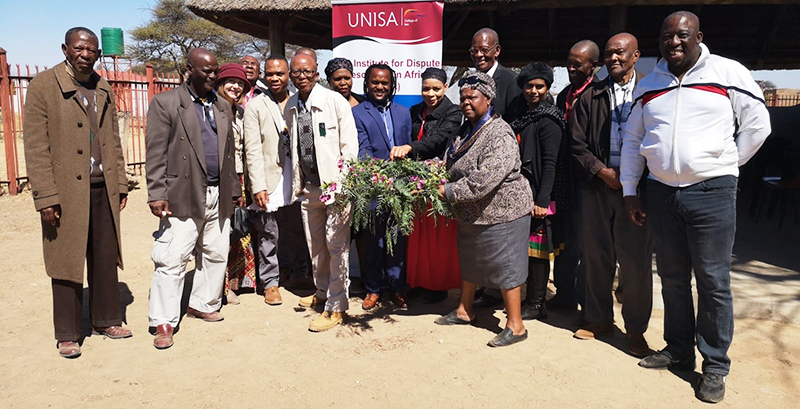
Towards the leading College of Law and Justice in Africa

Macdonald Rammala
African dispute resolution embraces a humanistic value system founded on the interconnectedness of human beings. Idiomatic expressions seek to harmonise the process of lekgotla (an African system of dispute resolution) and to heal families involved in disputes.
In a journal article, Macdonald Rammala, a researcher and chair of the Community Engagement Portfolio in the College of Law, discusses the interrelations between lekgotla and idiomatic expressions in traditional dispute resolution, as used by the Bakgatla Ba Mosetlha traditional council in Makapanstad village, North-West Province, South Africa.
He says that the interrelations between lekgotla and idiomatic expressions constitute a complex process with the aim of bringing families together to negotiate, confess, forgive, compensate, heal and engage in a ceremony that restores harmony in the community.
This interconnectedness is further highlighted by a Setswana idiom: "Mabogo dinku a thibana", meaning "working together, we achieve more". This emphasises the mutual support that the community enjoys when tackling issues, as reflected in idiomatic expressions.
Rammala’s research seeks to generate community knowledge that will contribute to the development of legal theory on dispute resolution in an African context, with specific reference to lekgotla.
Rammala has been working collaboratively with the traditional council members of the Makapan royal family for over five years and, arising from this, he saw the need to highlight the significant role of the authentic language used by members of traditional communities in lekgotla.
Through observation, it became clear to him that idiomatic expressions in traditional dispute resolution processes represent the lived experiences of the collective and are used with the intention of creating a path that leads to harmony and peace in the community.
"Idiomatic expressions expose the processes, procedures and systems that are followed in a traditional dispute resolution mechanism or the traditional courts which have been practised since time immemorial," he says. Idiomatic expressions have assisted people to solve intricate issues around livestock, murder, land, property, inheritance and marriage.

Unisa community engagement team with the Makapanstad traditional council members
In his paper, Rammala mentions idiomatic expressions and how they play a critical role in these traditional courts. "When we talk about traditional idiomatic expressions, we talk about the importance of language – the critical relevance of the use of language in traditional dispute resolutions," he says.
Such idiomatic expressions are based mainly on reconciliation and on mediating the dispute from the family level all the way to the traditional court level. The language, as used in idiomatic expressions, is also based on harmony and peace.
When a dispute is reported to the traditional court, the processes that are followed revolve, amongst other things, around the use of language in rebuilding the ties – or the social bond or social construct – that have been broken by either a dispute, or through misunderstanding or some conflict that has, for some reason, arisen.
"Negotiation through idiomatic expressions plays a crucial part before, during and post disputes," says Rammala.
In the African context, whenever you lose an elder, this is the equivalent of losing a library of knowledge and wisdom because most of the indigenous knowledge systems are not written down but are rather held deeply within the hearts of elders.
"At the height of the Covid-19 pandemic, we were losing critical knowledge holders, elders in their 80s and late 90s," Rammala reflects, adding that "to preserve the traditional court systems and idiomatic expressions in Africa, we deemed it as fitting to shoot a documentary".
The documentary is about showing the world that there are systems of traditional dispute resolutions in South Africa that are recognised by the Constitution and are outside of the formal courts. It takes the viewer through traditional court proceedings by unpacking the processes of negotiation, confession, forgiveness, compensation and healing.
Click here to view the full text of Rammala’s paper.
* Compiled by Mpho Moloele, PR and Communications, Department of Research, Innovation and Commercialisation
Publish date: 2022-06-15 00:00:00.0